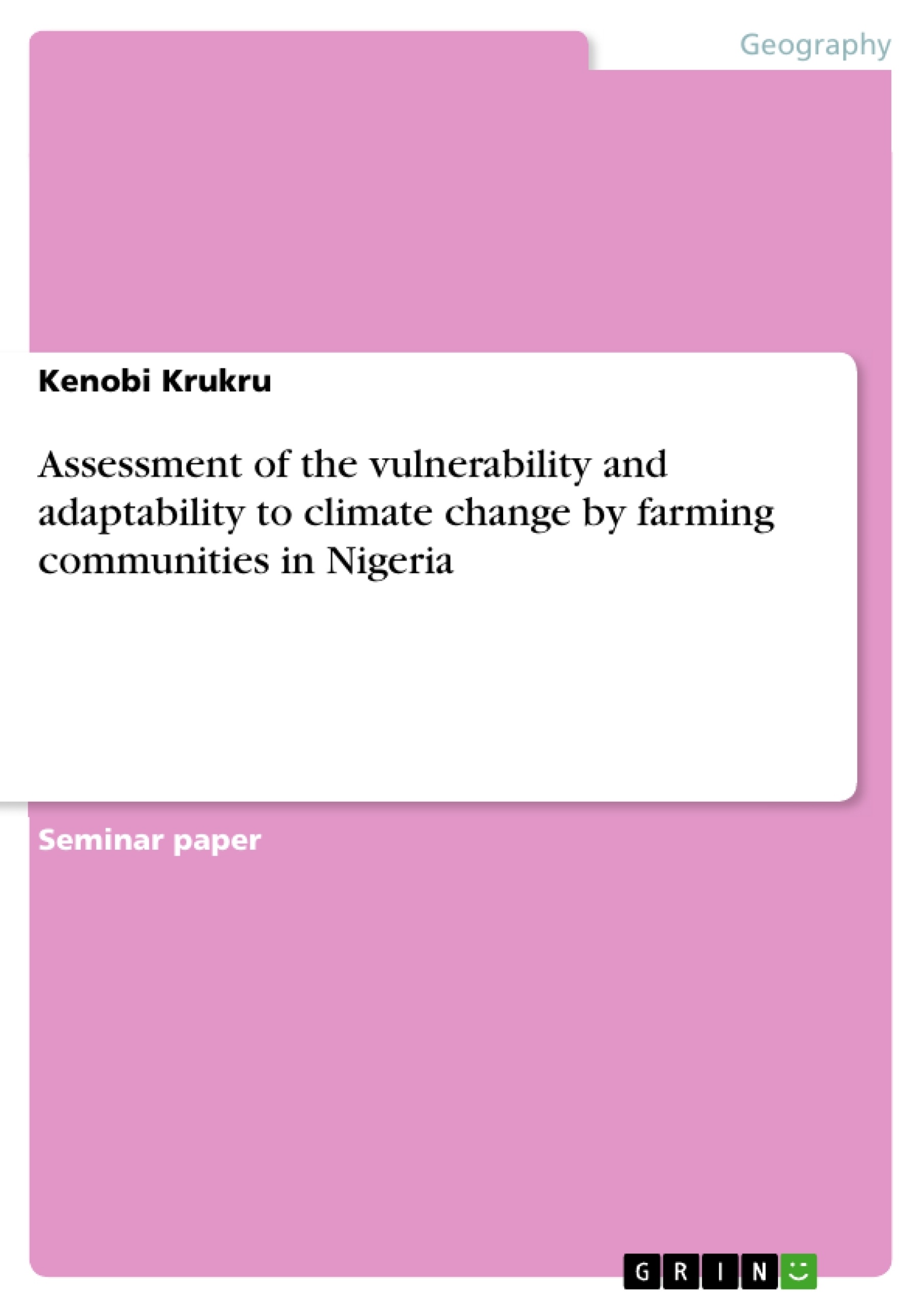This study focused on the assessment of the vulnerability and adaptability to climate change by farming communities in Sardauna Local Government Area of Taraba State. Four research questions were developed in line with the purpose of the study, and four correspondent hypotheses were formulated to guide the study. Relevant literatures were reviewed to cover the variables under investigation.
The population of the study was 100 registered farmers in the local government area. Purposive sampling technique was used to select the population from 11 political wards of Sardauna. Data for the study were obtained by the use of a questionnaire at 0.05 level of significance and 99 degree of freedom. From the analysis, it was found that flood, desertification, land degradation, cessation of rain and drought are the major indicators of climate change in Nigeria.
Insufficient extension services, lack of farmers enlightenment, negligence of government, religious/traditional believes of farmers and low farmers income are found to be major reasons the farming communities are highly vulnerable to climate change. Based on the above findings, conclusion, recommendations and suggestions for further studies were made.
Inhaltsverzeichnis (Table of Contents)
- CHAPTER ONE INTRODUCTION
- 1.1 Background to the study
- 1.2 Statement of the problem
- 1.3 Purpose of the study
- 1.4 Research questions
- 1.5 Research hypothesis
- 1.6 Significance of the study
- 1.7 Delimitation of the study
- 1.8 Definition of terms
- CHAPTER TWO LITERATURE REVIEW
- 2.1 Indicators to climate change
- 2.2 The vulnerability and adaptive capacity to climate change
- 2.3 Adaptation strategies to climate change
- 2.4 Measures of reducing vulnerability and increasing farmers' adaptive capacity
- 2.5 Summary of literature review
- CHAPTER THREE METHOD AND PROCEDURES
- 3.1 Research design
- 3.2 Area of the study
- 3.3 Population of the study
- 3.4 Sample
- 3.5 Sampling technique
- 3.6 Instrument for data collection
- 3.6.1 Validation of instrument
- 3.6.2 Reliability of the instrument
- 3.7 Procedure for data collection
- 3.8 Method of data analysis
- CHAPTER FOUR DATA ANALYSIS, RESULTS AND DISCUSSION OF FINDINGS
- 4.1 Presentation of results
- 4.2 Discussion of findings
- CHAPTER FIVE SUMMARY, CONCLUSION AND RECOMMENDATION
- 5.1 Summary of the study
- 5.2 Conclusion
- 5.3 Recommendations
- 5.4 Suggestions for further research
- REFERENCES
- APPENDICES
Zielsetzung und Themenschwerpunkte (Objectives and Key Themes)
This research project aims to assess the vulnerability and adaptability of farming communities in Sardauna Local Government Area of Taraba State, Nigeria, to climate change. The study seeks to understand the indicators of climate change affecting the region, the factors contributing to farmers' vulnerability, and the strategies they employ to adapt to these challenges.
- Vulnerability of farming communities to climate change
- Adaptive capacity of farming communities to climate change
- Indicators of climate change in the study area
- Factors contributing to farmers' vulnerability
- Adaptation strategies employed by farmers
Zusammenfassung der Kapitel (Chapter Summaries)
Chapter One provides an introduction to the study, outlining the background, statement of the problem, purpose, research questions, hypotheses, significance, delimitation, and definition of key terms. Chapter Two presents a comprehensive literature review, covering indicators of climate change, vulnerability and adaptive capacity, adaptation strategies, and measures to reduce vulnerability and enhance farmers' adaptive capacity. Chapter Three details the methodology and procedures used in the study, including the research design, study area, population, sample, sampling technique, instrument for data collection, data collection procedure, and data analysis method. Chapter Four presents the results of the data analysis and a discussion of the findings, analyzing the indicators of climate change, the levels of vulnerability and adaptive capacity, and the strategies adopted by farmers. Chapter Five summarizes the study, presents the conclusions drawn, and provides recommendations for addressing the vulnerability of farming communities to climate change.
Schlüsselwörter (Keywords)
Climate change, vulnerability, adaptation, farming communities, Sardauna Local Government Area, Taraba State, Nigeria, indicators, strategies, adaptation capacity, extension services, farmers' income, religious beliefs, traditional beliefs.
Frequently Asked Questions
What are the main indicators of climate change in Nigeria?
Major indicators found in the study include floods, desertification, land degradation, cessation of rain, and drought.
Why are farming communities in Nigeria highly vulnerable?
Vulnerability is caused by insufficient extension services, lack of farmer enlightenment, low income, and traditional or religious beliefs.
What was the focus area of this climate change study?
The study focused on the Sardauna Local Government Area of Taraba State, Nigeria.
What strategies do farmers use to adapt to climate change?
The research reviews various adaptation strategies and measures to increase the adaptive capacity of farming communities.
How does the government influence farmer adaptability?
The study highlights that government negligence and insufficient support services are major barriers to effective climate adaptation.
- Arbeit zitieren
- Kenobi Krukru (Autor:in), 2016, Assessment of the vulnerability and adaptability to climate change by farming communities in Nigeria, München, GRIN Verlag, https://www.grin.com/document/337206



